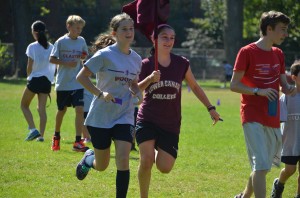 An interesting message landed in my in-box last week from a national educational list-serve. A headline declared that new research shows that kids should definitely move more. Movement brings more blood flow to the brain, making us more alert, engaged and focused on learning.
An interesting message landed in my in-box last week from a national educational list-serve. A headline declared that new research shows that kids should definitely move more. Movement brings more blood flow to the brain, making us more alert, engaged and focused on learning.
To be honest, I was a little stunned. I wondered why this was actually a headline as I considered it simply a statement of the obvious. For generations our school has focused on the old adage that “a healthy body leads to a healthy mind”. In fact, it’s in our school’s mission statement, “…the fullest development of students in mind, body, and heart…” But when I thought about it for a moment, I realized that we don’t always see the obvious. Sometimes we stare right past important information. We all need reminders about how to do better as well as practical tips about how to chip away at diminishing bad habits.
Our teachers received some great reminders along these lines during a workshop the week before school started. We all heard from acclaimed molecular biologist, researcher and brain expert, Dr. John Medina. He has written an influential book emanating from his recent research, called Brain Rules. He offers 12 important brain rules: practices that enhance brainpower and function. According to him, brain rule number one is the importance of exercise. Not only is exercise good for the body, but the current research is irrefutable – physical movement also significantly and directly enhances brain function.
On his website, Dr. Medina states, “exercise zaps harmful stress chemicals, it boosts problem-solving, planning and attention”. Medina reminds us that the brain evolved under conditions of nearly constant motion. We have been designed to function, think and complete tasks more effectively after exercise. The increased oxygen flow to the brain simply leads to better mental sharpness.
This current research has made us ask a lot of questions at LCC. We include PE and athletics in our programmes, but should we also adapt our academic programmes and schedules to include more movement for students? This is a question we will review during the coming school year.
This week I urged our Middle and Senior School students to move more during recess in the morning and after lunch. If they actually want the latter half of their day to go well, it’s a good idea is to go outside regularly and run around during their breaks. For many teens it’s time to rediscover the sheer fun of play and exercise – nothing organized by teachers – just running around for fun. And yes, the likelihood is that this will actually help them do better in class. In the process, many will say goodbye to that awkward post-lunch nap on their classroom desks. Less zoning out and more zoning in! — Chris Shannon, Headmaster

